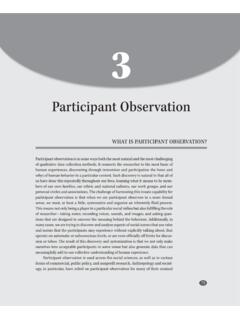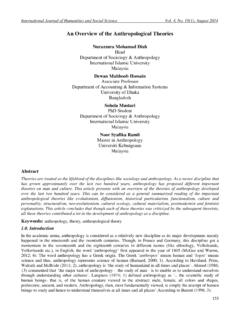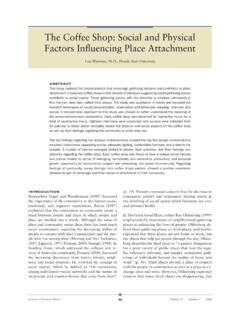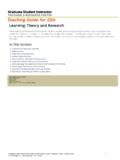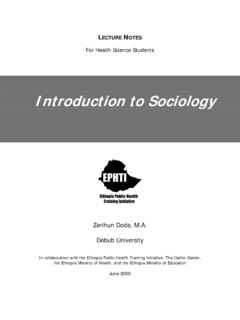Transcription of Challenges Pre-School Teachers Face in the Implementation ...
1 Journal of Education and Practice ISSN 2222-1735 (Paper) ISSN 2222-288X (Online) , , 2016 54 Challenges Pre-School Teachers Face in the Implementation of the Early Childhood Curriculum in the Cape Coast Metropolis Simon Ntumi Department of Educational Foundations, College of Education Studies , University of Cape Coast, Ghana ABSTRACT The study examined the Challenges that Pre-School Teachers encounter in the Implementation of the early childhood curriculum; exploring teaching methods employed by pre-schools Teachers in the Cape Coast Metropolis. The study employed descriptive survey as the research design.
2 A convenient sample of 62 Pre-School Teachers were selected from a total of 45 pre-schools in the Cape Coast Metropolis. The instruments used to elicit information from the respondents was a structured questionnaires which validity and reliability were obtained through a pilot study that revealed alpha reliability coefficient and for Section B and C respectively. The key findings of the study revealed that Pre-School Teachers are faced with a lot of Challenges in implementing the early childhood curriculum. A notable one among them are that most Pre-School Teachers do not understand the early childhood curriculum, Pre-School Teachers do not have enough teaching and learning materials to help them implement the Early childhood curriculum, parents do not involve themselves in their wards education therefore it makes it difficult for Pre-School to do the work alone.
3 It was also revealed that Teachers , teaching and learning materials are the main factors that influence the Implementation of the early childhood curriculum. The researcher recommended that private proprietors and government authorities overseeing the Pre-School program should organise frequent in-service training for both Teachers and parents with respect to early childhood education curriculum. KEYWORDS: Early Childhood Education, Early Childhood Curriculum, Implementation , Ghana INTRODUCTION Background to the study Etymologically, the word curriculum is derived from the Latin word curere which is a literal translation of race course (Connelly & Clandinin, 1988). This metaphoric description of curriculum is in place since learners in schools or training institutions consider their modules or course programme as series of obstacles or hurdles to be cleared (Adentwi, 2005).
4 Adentwi (2005) further asserted that to a very large extent how we approach the education of young children depends on what we believe children are like and how they act and behave in life. Often, curriculum for pre-schools are structured around some underlying assumptions about the nature of children. For example an idea that children learn actively by exploring their environment would result in a different type of early childhood curriculum than one based on the idea that children learn passively by being taught specific information and skills. In the same vain, a view that children are basically unruly and need strict control so that they will learn appropriately would result in a different guidance approach than the notion that children generally strive toward social acceptance from others by conforming to reasonable expectations (Adentwi, 2005).
5 According to Langenbach and Neskora (1977), the early childhood curriculum is a product of both long- range and short term planning. Many programme start with a master plan that covers a sizeable period, for instance a year, and is then filled in with details for shorter segments of time. In other words, the curriculum of the young children is a product of the interest of the children. This means that the spontaneity and flexibility are the hallmarks of planning as far as such curriculum. In either case, Pre-School curriculum has to be integrally related to several prominent factors: programme philosophy, goals, objectives, and evaluation. Activities are thus evaluated on an ongoing basis, returning to the starting point, goals and objectives are reassessed and adjusted as needed, starting the cycle anew (Lawton, 1988).
6 Pre-School Teachers as key players in young children education have a crucial roles to play in early childhood curriculum Implementation . This may include child guidance and discipline, respecting cultural diversity, adopting the appropriate methods of teaching and learning, encouraging self-dependence and many (McDonnell, Journal of Education and Practice ISSN 2222-1735 (Paper) ISSN 2222-288X (Online) , , 2016 55 1999). Establishing reciprocal relationship with families and other Teachers (Lundin, 2000). Creating a caring community of learners, teaching to enhance development and learning in the classroom (NAEYC, 2005).
7 In Pre-School curriculum Implementation , both personal and environmental factors are effective. As a researcher I agree to the idea of National Association of Education of Young Children that as Teachers bring their past experience into classroom settings, their perceptions regarding how these young children learn and develop affect quality of the Pre-School curriculum Implementation . Kern, Kruse and Roehring (2007) also maintains the ideas that Teachers perception about teaching and learning are strongly influencing the Implementation of early childhood curriculum. In other words, once the Teachers are defending the ideology of the curriculum being implemented, then the performance of the Pre-School Teachers in the real classroom setting is affected positively during Implementation .
8 Park (2008) also suggested that understanding of the early childhood curriculum by the Teachers is crucial for proper Implementation of the curriculum to help achieve its goals. This means that once the Pre-School Teachers do not comprehend what the early childhood curriculum s theoretical and practical framework in details, they will not be able to successfully implement the early childhood curriculum. That notwithstanding, the Ministry of Education, Ghana under the Division of Curriculum research and Development (2006) maintains the idea that, Ghanaian Pre-School curriculum is structured in such a way it recognizes the principles that children at early stage learn by active exploring.
9 This stem from the fact that, the early childhood curriculum should be implemented in such a way it will provide children with expressive activities that demands their maximum cooperation and participation in all learning activities. Statement of the problem According to NAEYC (2005), there are standards for serving a good quality of education. Therefore there is the need for Teachers to meet those standards especially, when their role is related to curriculum Implementation . However, knowledge in early childhood curriculum is more challenging and heavier as greater responsibility creates on the shoulders of the early childhood educators. It appears that despite what is planned and documented in the early childhood curriculum, practices of Teachers and events going on in the classroom settings are not being realized.
10 That notwithstanding the above, the report of Curriculum Research and Development Division (2006) holds the rationale that, early childhood curriculum has been enacted to meet the developmental needs of children at the formative years and also to help children come out with tremendous potentials and experiences covering various area of human experiences. However it appears in their report that the early childhood curriculum is not given the necessary recognition by Pre-School Teachers . In this sense, as a researcher identifying the Challenges Pre-School Teachers face during the Implementation of the curriculum is a necessity because once the Challenges were detected precisely, it is easier to deal with those Challenges by finding ways of managing those Challenges .












